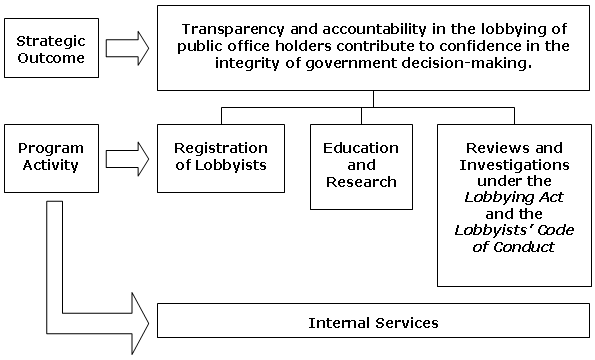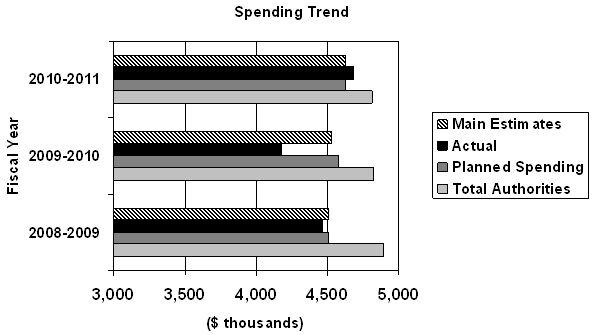Common menu bar links
Breadcrumb Trail
ARCHIVED - Office of the Commissioner of Lobbying of Canada - Report
 This page has been archived.
This page has been archived.
Archived Content
Information identified as archived on the Web is for reference, research or recordkeeping purposes. It has not been altered or updated after the date of archiving. Web pages that are archived on the Web are not subject to the Government of Canada Web Standards. As per the Communications Policy of the Government of Canada, you can request alternate formats on the "Contact Us" page.
Message from the Commissioner of Lobbying

I am pleased to present the 2010-2011 Departmental Performance Report for the Office of the Commissioner of Lobbying. As the Commissioner of Lobbying, my primary responsibilities are to administer a public registry for lobbyists to disclose their activities and to ensure compliance with the Lobbying Act and the Lobbyists' Code of Conduct. My mandate also requires me to implement an education program to raise awareness of the legislation and its requirements among lobbyists, their clients and public office holders.
The Lobbying Act is based on the premise that lobbying is legitimate and must be conducted in a transparent manner. The Registry of Lobbyists continues to be the primary instrument for the public disclosure of lobbying activities at the federal level. As such, my Office continually strives to make the system easier to use and more dependable, both for lobbyists to report on their activities and for Canadians who wish to consult this information. The sooner information regarding lobbying activities is disclosed publicly through the Registry, the better transparency is served. I am pleased to report that, in 2010-2011, processing times for registrations were greatly reduced.
I believe awareness of the Lobbying Act's requirements leads to greater compliance. I am proud that my staff and I met with nearly 1,500 individuals to explain the requirements of the Lobbying Act, including lobbyists, public office holders, parliamentarians and their staff, my counterparts, academics and university students. In addition, I appeared four times before the House of Commons Standing Committee on Access to Information, Privacy and Ethics and once before the House of Commons Standing Committee on Procedure and House Affairs, in order to provide members of these committees with information about the Lobbying Act and my Office's work.
Regarding the enforcement of the Lobbying Act, I have achieved several important results. This year, I tabled my first three Reports on Investigation in both Houses of Parliament. Through these Reports, I informed parliamentarians that three lobbyists had breached the Lobbyists' Code of Conduct. Two of the Reports dealt with lobbyists who engaged in political activities that, in my view, advanced the private interest of a public office holder with whom the lobbyists interacted during the course of their lobbying activities. I believe that by exposing wrongdoing, my Reports to Parliament both deter the individual from repeating the offence and provide all lobbyists with an incentive to comply with the Lobbying Act and the Lobbyists' Code of Conduct.
This year also marked the beginning of the statutory review of the Lobbying Act. At my March 2011 appearance before the Standing Committee on Access to Information, Privacy and Ethics, I indicated that, while several aspects of the legislation are working well, I had recommendations for consideration during the review. In particular, I recommended that amendments to the Lobbying Act could be made to disclose more lobbying activities, for example by removing the "significant part of duties" registration threshold from the Act. I also recommended that Parliament consider providing me with additional instruments to enable me to better enforce the legislation, such as a system of administrative monetary penalties. I look forward to continuing to assist Parliament during its review of the legislation.
Karen E. Shepherd
Commissioner of Lobbying
Section I — Organizational Overview
Raison d'�tre
The Office of the Commissioner of Lobbying (OCL) supports the Commissioner of Lobbying, an Agent of Parliament responsible for the administration of the Lobbying Act (the Act). The Act provides for the establishment of a Registry of Lobbyists that seeks to improve transparency and accountability by requiring the disclosure of communications between lobbyists and federal public office holders. Greater disclosure of lobbying activities contributes to increasing the confidence of Canadians in the integrity of government decision-making.
Responsibilities
The Commissioner of Lobbying is responsible for the administration of the Lobbying Act. The authority of the Commissioner is derived from the Act.
The mandate of the Commissioner is threefold:
- Establish and maintain the Registry of Lobbyists, which contains and makes public the registration information disclosed by lobbyists, as well as their monthly returns regarding communications with designated public office holders;
- Develop and implement educational programs to foster public awareness of the requirements of the Act; and
- Undertake administrative reviews and investigations to ensure compliance with the Act and the Lobbyists' Code of Conduct (the Code).
Under the Act, the Commissioner of Lobbying also has the authority to grant exemptions to former designated public office holders who are subject to a five-year prohibition on lobbying activities.
The Commissioner reports annually to Parliament on the administration of the Act and the Code. The Commissioner is also required to table Reports on Investigations, which include her findings, conclusions and the reasons for her conclusions, to Parliament.
Strategic Outcome and Program Activity Architecture
In order to effectively pursue its mandate, the OCL aims to achieve the following strategic outcome:
Transparency and accountability in the lobbying of public office holders contribute to confidence in the integrity of government decision-making.
The Program Activity Architecture (PAA) for the OCL is its basis for reporting to Parliament. The PAA reflects how the OCL allocates and manages the resources under its control to achieve its intended outcome.

Text description of this graph is available on a separate page.
Organizational Priorities
Performance/Priority Status Legend
Exceeded: More than 100 per cent of the expected level of performance (as evidenced by the indicator and target or planned activities and outputs) for the expected result or priority identified in the corresponding Report on Plans and Priorities (RPP) was achieved during the fiscal year.
Met all: 100 per cent of the expected level of performance (as evidenced by the indicator and target or planned activities and outputs) for the expected result or priority identified in the corresponding RPP was achieved during the fiscal year.
Mostly met: 80 to 99 per cent of the expected level of performance (as evidenced by the indicator and target or planned activities and outputs) for the expected result or priority identified in the corresponding RPP was achieved during the fiscal year.
Somewhat met: 60 to 79 per cent of the expected level of performance (as evidenced by the indicator and target or planned activities and outputs) for the expected result or priority identified in the corresponding RPP was achieved during the fiscal year.
Not met: Less than 60 per cent of the expected level of performance (as evidenced by the indicator and target or planned activities and outputs) for the expected result or priority identified in the corresponding RPP was achieved during the fiscal year.
| Priority | Type1 | Program Activity |
|---|---|---|
| Maintain the Lobbyists Registration System | Ongoing | Registration of Lobbyists |
| Status: Met all. | ||
Improvements: Enhancements to the search functionality and reporting capabilities of the LRS will provide greater access to and a better understanding of the information contained in the Registry. The OCL recognizes the importance of making data in the Registry available to Canadians in ways that meet their information needs. In 2011-2012, the OCL will administer a client satisfaction survey to measure if those searching the Registry are able to find the information they seek. |
||
| Priority | Type | Program Activity |
|---|---|---|
| Promote awareness of the requirements of the Lobbying Act and the Lobbyists' Code of Conduct | Ongoing | Education and Research |
| Status: Met all. | ||
Improvements: The launch of the survey of outreach tools was delayed due to the May 2011 general election. It will be conducted in 2011-2012. The OCL's new website will be launched in 2011-2012. Improved navigability on the site will ensure easier access to the full range of information and tools available to clients and other users. |
||
| Priority | Type | Program Activity |
|---|---|---|
| Pursue enforcement of the Lobbying Act and the Lobbyists' Code of Conduct and communicate the results | Ongoing | Reviews and Investigations under the Lobbying Act and the Lobbyists' Code of Conduct |
| Status: Met all. | ||
Improvements: An internal review of all existing review and investigation files was initiated in March 2011 and will be concluded in 2011-2012. All files transferred from the former Office of the Registrar of Lobbyists to the Office of the Commissioner of Lobbying will also be subject to review. The review will cover information such as: date opened; date closed; allegation; outcome; and compliance measure taken. It will ensure that the data captured and reported with the case management system is consistent, accurate and complete. |
||
Risk Analysis
The Office of the Commissioner of Lobbying (OCL) has established and maintains the federal registry of lobbyists and lobbying activities known as the Lobbyists Registration System (LRS). A risk exists that the information in the LRS is not accurate or timely. The OCL shares the challenges of any Office charged with maintaining a large-scale registry in terms of accuracy and timeliness of disclosure while ensuring registrant compliance and system integrity. The LRS is a complex system which requires ongoing monitoring, maintenance, documented procedures and improvements to ensure it remains accessible to users and that the information it contains is accurate.
There is a risk that the LRS may not be continuously accessible to registrants. This would reduce transparency of lobbying activities. To mitigate this risk, the OCL strives to minimize registration delays both by putting in place appropriate registration procedures and by preventing system interruptions. A number of failsafe mechanisms have also been built into the system. In the event that the Registry does shut down, these mechanisms will serve to minimize downtime.
There is a risk of errors in data reporting by lobbyists. The Lobbying Act (Act) requires that lobbyists disclose certain communications involving designated public office holders, e.g. ministers, ministerial staff, deputy ministers, Members of Parliament and Senators. This reporting requirement is satisfied online by lobbyists directly inputting the data. As a result, reporting errors may occur. The OCL continually educates lobbyists on how to reduce reporting errors. The OCL also monitors the overall accuracy of monthly communication reports through regular sampling.
There is a risk that the Commissioner's decisions may be overturned by the Federal Court. The OCL conducts administrative reviews and investigations to ensure compliance with the Act and the Lobbyists' Code of Conduct. It also reviews applications for exemption from the five-year lobbying prohibition for former designated public office holders. The Commissioner's decisions with respect to administrative reviews, investigations and applications for exemption may be subject to judicial review by the Federal Court. The OCL conducts reviews and investigations that are fair, thorough and well-documented, and that will stand the test of litigation, if required.
There is a risk that our service providers may fail to meet the needs of the OCL. The OCL is a small organization that relies on other federal government institutions for many of its corporate services, including information technology, human resources and financial services. Agreements with service providers are carefully monitored to ensure that all practices and services are consistent with OCL requirements, standards, and internal controls.
An additional measure that has been taken by the Commissioner to identify and manage risks faced by the Office is the establishment of the Audit and Evaluation Committee (AEC). The AEC supports the Commissioner in her role of Deputy Head of a federal institution. The AEC is an independent advisory committee that provides objective advice and recommendations to the Commissioner regarding the organization's corporate management and accountability. The Committee advises on audits and evaluations, risk management, control and governance frameworks and processes.
Summary of Performance
| Planned Spending | Total Authorities | Actual Spending |
|---|---|---|
| 4,625 | 4,815 | 4,686 |
| Planned | Actual | Difference |
|---|---|---|
| 28 | 27 | (1) |
| Performance Indicator | Target | 2010-2011 Performance |
|---|---|---|
| The level of compliance with the Lobbying Act and the Lobbyists' Code of Conduct. | 100% | Through interactions with stakeholders (lobbyists, public office holders, and the public), a deeper understanding and a greater awareness of the requirements of the Lobbying Act was observed. This, in turn, results in a high level of compliance with the Lobbying Act and the Lobbyists' Code of Conduct. |
| Program Activity2 | 2009-2010 Actual Spending ($ thousands) |
2010-2011 ($ thousands) | Alignment to Government of Canada Outcomes | |||
|---|---|---|---|---|---|---|
| Main Estimates |
Planned Spending |
Total Authorities |
Actual Spending |
|||
| Registration of Lobbyists | 1,256 | 1,530 | 1,530 | 1,099 | 1,082 | An accountable, transparent, and responsive government |
| Education and Research | 943 | 891 | 891 | 944 | 927 | An accountable, transparent, and responsive government |
| Reviews and Investigations under the Lobbying Act and Lobbyists' Code of Conduct | 886 | 1,243 | 1,243 | 999 | 946 | An accountable, transparent, and responsive government |
| Total | 3,085 | 3,664 | 3,664 | 3,042 | 2,955 | |
| Program Activity | 2009-2010 Actual Spending ($ thousands) |
2010-2011 ($ thousands) | |||
|---|---|---|---|---|---|
| Main Estimates |
Planned Spending |
Total Authorities |
Actual Spending |
||
| Internal Services | 1,094 | 961 | 961 | 1,773 | 1,731 |
Expenditure Profile

Text description of this graph is available on a separate page.
Over the last three fiscal years, the OCL reference levels have only been adjusted for compensation due to signed collective agreements and related adjustments to employee benefits plan. Therefore, these adjustments explain fully the variances between Main Estimates to Main Estimates, as well as Main Estimates to Planned Spending.
The variances between Main Estimates and Total Authorities are explained by compensation received from Treasury Board central votes to cover the costs of newly signed collective agreements, parental leave expenditures, as well as the receipt of the operating carry forward.
The increase in 2010-2011 in actual spending in comparison to 2009-2010 is mainly related to salary increases as well as costs for the provision of internal services received from other government departments and agencies.
Estimates by Vote
For information on our organizational Vote and/or statutory expenditures, please see the 2010–2011 Public Accounts of Canada (Volume II) publication. An electronic version of the Public Accounts is available on the Public Works and Government Services Canada website.3
